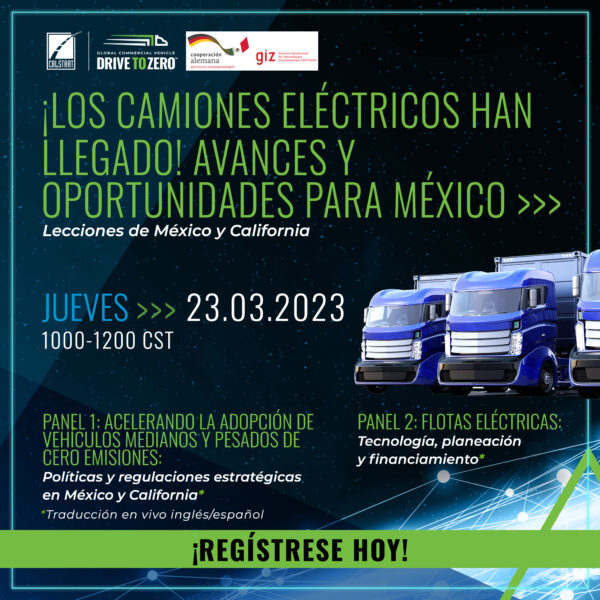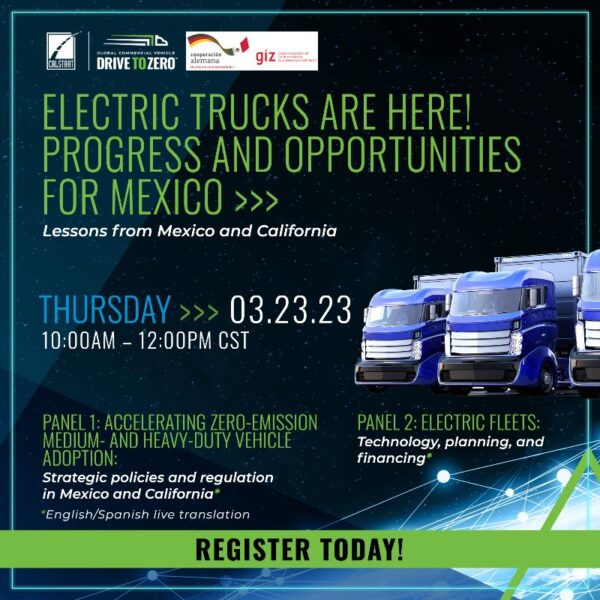We are excited to continue our conversation on the future of zero-emission medium- and heavy-duty vehicles (ZE-MHDVs) in the Americas with our event Electric Trucks Are Here! Progress and Opportunities for Mexico. Drive to Zero is gathering top public- and private-sector innovators from Mexico and California to discuss accelerating ZE-MHDV adoption in a virtual meeting on March 23. Join us to learn about key policy interventions as well as technology, planning, and financing for fleets. Register now for the two public panels to be held this Thursday!
If you did not receive an invitation to the three invite-only policymaker workshops taking place on March 30, 2023, and would like to request inclusion, please email Ricardo Garcia Coyne at rgarciacoyne@calstart.org.

Program Updates
Financing the Transition to Electric Trucks: Framing Paper Release
On March 14, at the Transforming Transportation 2023 event in Washington, D.C., Drive to Zero, along with The World Bank, Dutch National Vehicle Authority (RDW), Netherlands Enterprise Agency (RVO), World Business Council for Sustainable Development (WBCSD), and The International Council on Clean Transportation (ICCT), supported the Smart Freight Centre’s launch of the ZEVWISE series of global events. Smart Freight Centre, CALSTART, and Netherlands RVO collaborated on a framing paper to help orient the discussion on how financing is affecting the transition toward electric trucks and how it can be part of the solution to take down several structural barriers to adoption. This paper is part of the ZEVWISE series of discussions to tackle this increasingly pressing issue, especially with new policies in California and the European Union accelerating the transition to ZE-MHDVs and international shippers committing to reduce emissions in their supply chain this decade.
Download the framing paper here.
For more information on the ZEVWISE series, click here.
Clean Energy Canada’s “British Columbia Medium- and Heavy-Duty Vehicle Convening”
CALSTART/Drive to Zero’s Owen MacDonnell will be a featured expert at Clean Energy Canada’s “British Columbia Medium- and Heavy-Duty Vehicle Convening” event on April 19. Key actors in British Columbia and other experts will be developing a case study for catalyzing ZE-MHDVs in Canada. Stay tuned for public-facing resources to be created after this discussion. As the first country signatory of the Global Memorandum of Understanding (MOU) on ZE-MHDVs, the Canadian government continues to take concerted action to curb the country’s transportation emissions, particularly through its ambitious emissions reduction plan released in 2022.
Join the Drive to Zero Team
Drive to Zero has an exciting job opening: the Global Program Manager will lead Drive to Zero’s partner recruitment and engagement, infrastructure work, and Drive to Zero activities in key regions. Please help us spread the word.
News Updates
The buzz around market-ready electric trucks continues to generate headlines not only in the Americas—take new zero-emission truck model announcements from Hino Trucks and Mack Trucks, for instance—but across the globe. Volvo Trucks announced that it will begin delivering heavy electric trucks to customers in South Africa this May, and in the wake of the European Commission’s proposal for revised CO2 heavy-duty vehicle standards for trucks last month, new truck models in Europe have hit the road for the first time. Scania’s 66-tonne electric truck, Norway’s largest electric truck, was delivered to the Verdalskalk limestone quarry, and DB Schenker, one of the world’s leading logistics service providers, has rolled out the first pilot all-electric Volta Zero truck as part of its European field test. These trucks, along with the rest of Europe’s zero-emission road freight transport, can anticipate future support from a new alliance to build a network of truck terminals, which includes hydrogen and electric energy solutions for charging and refueling.
Advancements in electrifying last-mile delivery vans also grabbed our attention. The U.S. Postal Service announced it will purchase 9,250 Ford E-Transit battery-electric vehicles and 14,000 EV charging stations as it works to electrify a large portion of its mail delivery fleet. In Canada, Canada Post received 14 electric delivery vans at its Nanaimo depot, a now 100% electric fleet, and Purolator announced an approximately $1 billion investment to electrify its Canadian network, starting with deploying 25 Ford E-Transit vans this month. Speaking of billion-dollar investments, BYD has planned its budget with more than $20 billion for its commercial battery-electric vehicle division through 2025, launching new commercial vehicle models in markets including China, Europe, and Japan.
Not to be outdone, global zero-emission bus deployments show no signs of stopping. Jamaica’s state-owned public transit company has announced its electric fleet will grow by 200 buses over the next three years; the Australian state of Queensland will double its fleet with an additional 40 electric buses; and Olectra Greentech has received the reportedly largest single order for 550 electric buses in South India. The British government will also invest £25.3 million to roll out 117 zero-emission buses in four regions around the country, and Singapore will begin electrifying their public bus fleet with an issued tender for 400 new battery-electric buses as part of various new environmental measures. And we would be remiss not to highlight the Sea Change, the world’s first hydrogen-electric passenger ferry, which arrived in San Francisco this month and will begin moving passengers in the Bay Area later this year.
Please share new information, potential partners, and innovative practices to achieve our Drive to Zero goals at info@globaldrivetozero.org. Follow us on Twitter @TeamDrivetoZero. Please feel free to share this newsletter with others.
– Emily Varnell, Technical Writer, CALSTART








